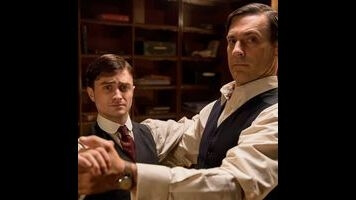If there is one thing that A Young Doctor’s Notebook is about, it’s getting Daniel Radcliffe and Jon Hamm in the same scene as often as possible. Not their characters—or their two halves of a character, as Hamm plays the older version of Radcliffe—but instead the actors themselves. A Young Doctor’s Notebook uses an unconventional time-shifting, character-doubling method to put Hamm and Radcliffe together, the former being the quasi-imaginary friend of the latter. High jinks ensue. These two are actors whose comic potentials are rarely tapped, so it’s joyous to see them playing off of each other, even when the humor shifts quickly to devastating. (That might be Hamm’s own doing—the actor is also an executive producer of the show.)
There are a lot of stories that have a character that only the audience and protagonist can see and hear while no one else can—Wilfred does it, Moone Boy does it, and Battlestar Galactica did it, too. But unlike all of those, the doctor in this series—he’s named this season as Nika, but last season, he was just “the doctor”—is talking to himself, in a way. The doubling is the show’s way of personifying Mikhail Bulgakov’s very present narration in A Country Doctor’s Notebook, the short stories upon which the series is based. It’s a way, too, to engage with the deception of memory and the continued conversation anyone has with their better or worse selves as they go through life. But mostly, it’s a way to get Radcliffe and Hamm to make faces at each other. (Literally: The two versions of Doctor Nika have a petulant relationship that smacks of sibling rivalry.)
It’s a conceit that is fun, because it makes no sense at all—as people are usually dogged by their pasts, not their futures, why would the older doctor haunt the younger one, instead of the other way around? Do other people think Nika is talking to thin air? And do they have any influence on each other? Can an apparition of Nika’s future self change his behavior? Can revisiting his past self encourage Nika to become someone or something else? But because the conceit doesn’t totally make sense—and because the show stops just short of answering any of these questions—A Young Doctor’s Notebook remains an artifact without much purpose except fascination.
Fortunately, it continues to be fascinating. A Young Doctor’s Notebook’s first season cheerfully offered up the grotesque and horrible as comedic material—milking an 8-year-old girl’s amputation for unexpected, irreverent laughs. (It’s British. It works.) This season moves a little away from the humor of human, fragile bodies to investigate the terrible depths an addict will sink to in order to obtain his fix—whether that’s morphine or a pretty woman, as the case may be. Young Nika is capable enough, but being a doctor doesn’t automatically make him a good person. And as the harsh life of Soviet Siberia takes its toll on the cast of characters—the Bolsheviks clash with the White Guard and both send their wounded to the hospital; fleeing aristocrats and frostbitten peasants take refuge there, too. In between, there is unending cold and solitude—illustrated by one character whose highlight of the year is a particularly good anecdote. Nothing about this life is easy. A Young Doctor’s Notebook offers a glimpse of how a man might become jaded in this desolate place, told through ostensibly funny stories of his long-ago youth, when, as he proclaims in the first season, “I was happy.”

 Keep scrolling for more great stories.
Keep scrolling for more great stories.
